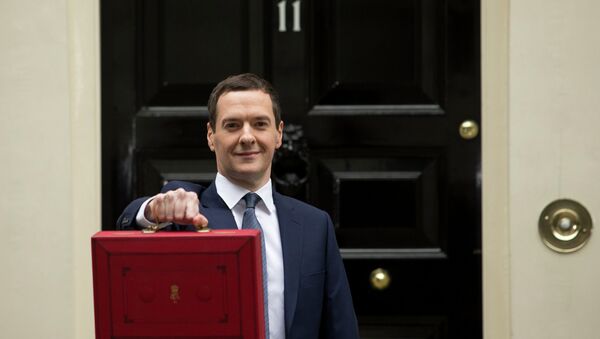Osborne's emergency budget was called just weeks after winning a majority in May’s elections and the first by a Conservative led administration since 1996. UK Chancellor said:
"This is a Budget that puts security first, and recognizes the hard-working British people."
He called it a "one national budget."
Although billed as a balanced, fair budget for working people, political commentator Tom Newton Dunn said in a tweet ahead of the speech: "Nobody will be talking about Osborne easing austerity in an hour's time. Expect significant brutality."
Today I will present a Conservative Budget — a Budget that puts economic security first pic.twitter.com/yQ8kD8nmo9
— George Osborne (@George_Osborne) July 8, 2015
The Conservatives are seen as a party of the rich and Osborne – who has an estimated personal fortune of around $6 million — told the UK Parliament that the rich were paying their way and that taxpayer handouts were not sustainable and took a swingeing axe to Britain’s welfare system.
Can George Osborne write like an injket printer? http://t.co/LUXTuP0e17pic.twitter.com/9KtTj95Mwa
— Matt Chorley (@MattChorley) July 8, 2015
He said Britain spends spend more on family benefits than Germany, France or Sweden. He announced he would reduce the total amount of all benefits claimable per household from £26,000 to £23,000 in London, and £20,000 in the rest of the country.
Child Benefits Limited to Two Kids
Osborne also limited the $4,265 a year payment for each additional child per family by reducing the support provided through tax credits and Universal Credit to two children.
"Families who have a third or subsequent child after April 2017 will not receive additional Tax Credit or UC support for this child," he said.
Osborne stitching up our children — cutting financial support and failing to tackle climate change #Budget2015
— Caroline Lucas (@CarolineLucas) July 8, 2015
Osborne also slashed the level of earnings, at which a household’s benefits can start, from $9860 to $5912, meaning that only the very poorest would be eligible for benefits.
He also cut the grant made available to low income families for sending their children to university and paying the tuition fees. Young people will be made to take out a student loan, which will have to be repaid once their future income rises to more than $32,000. Critics say this will deter students from poor families heading for university.
Hunger and Foodbanks on the Rise
David McAuley, Chief Executive of The Trussell Trust, which operates food banks for those on low incomes, told Sputnik: “We are not opposed to the principle of reform, but feel strongly that both present and planned reforms affecting vulnerable individuals and families must be examined and measured to ensure a safety net is in place to help those most in need of support.
"Our food banks continue to report that large numbers of clients who are in work are struggling with insecure work, low wages and high living costs."
"We are concerned that we find ourselves helping hundreds of thousands of people each year who come to a Trussell Trust food bank simply because government departments make avoidable, preventable mistakes,” he said.
We welcome Government’s move towards all employees being paid a living wage. Minimum wage £7.20 ph frm April 2016, £9ph by 2020 #budget2015
— The Trussell Trust (@TrussellTrust) July 8, 2015
Osborne saved his biggest giveaway until the end of his speech, when he said that the UK would move from having a compulsory national minimal wage, which is currently $9.98 an hour for over 21 year-olds to a living wage of $13.82 per hour.
Frances O’Grady, the TUC general secretary, told Sputnik: "The chancellor is giving with one hand and taking away with the other. Massive cuts in support for working people will hit families with children the hardest."


